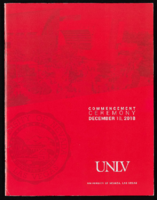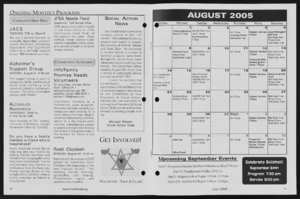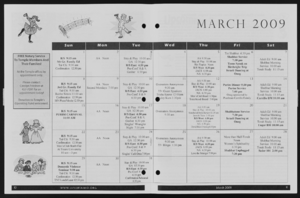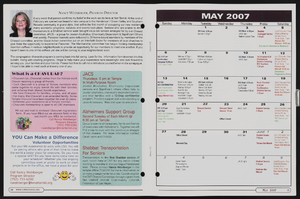Search the Special Collections and Archives Portal
Search Results

Transcript of interview with Harriett Thornton Hicks by Claytee D. White, October 28, 2009
Date
Archival Collection
Description
Harriett Thornton Hicks was born June 8, 1913,in Parowan, Utah; the thirteenth child of 14. She tells of her pioneer family who dwelled in two log cabins—one for cooking and one for sleeping. In 1931, she moved to Las Vegas to join two older sisters who had relocated here. She was picked up at the train by young Charles Hicks, who was a friend of her sisters. Charles had a car and offered to provide transportation. Within three years, the two were married. She quit her drug store job to raise a family and he worked for the railroad, the only business at the time in Las Vegas. At the age of 96, Harriett recalls a range of community milestones, such as the Boulder Dam, the news of Pearl Harbor bombing, Fremont Street, the Biltmore Hotel, and how to live in a city with mob influences.
Text

University of Nevada, Las Vegas (UNLV) Spring 2021 commencement program
Date
Archival Collection
Description
Commencement program from University of Nevada, Las Vegas Commencement Programs and Graduation Lists (UA-00115).
Text

University of Nevada, Las Vegas (UNLV) 2020 and 2021 graduate college commencement program
Date
Archival Collection
Description
Commencement program from University of Nevada, Las Vegas Commencement Programs and Graduation Lists (UA-00115).
Text

University of Nevada, Las Vegas (UNLV) Fall 2018 commencement program
Date
Archival Collection
Description
Commencement program from University of Nevada, Las Vegas Commencement Programs and Graduation Lists (UA-00115).
Text

Sylvia Alvarado interview, April 12, 2019: transcript
Date
Archival Collection
Description
Interviewed by Rodrigo Vazquez, Monserrath Hernández, and Barbara Tabach. Sylvia Alvarado talks about growing up in North Las Vegas and her Catholic upbringing in a Mexican household. Her studies in Journalism & Media Studies led her to her career as a radio host on English and Spanish-speaking programs. She also talks about speaking "pocha" Spanish and the Latinx influence in radio programming.
Text

Interview with Bennie Reilley, Sr., May 10, 2004
Date
Archival Collection
Description
Access note: May not quote in any form without written permission from interviewee
Text




